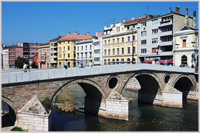Like most people, my thoughts have turned lately to the centenary of the outbreak of the First World War. Actually, it is impossible to ignore it, in the face of newspaper and magazine articles, to say nothing of the television coverage.
I have a "Traveller's Tale" to tell, which is relevant, but before I reach it, I must mention the coincidence of finding some family mementoes in the course of clearing the attic – which I long ago converted into an office. At that time a mass of papers and books and boxes were simply shoved into one corner, the plan being to sort them out at some convenient moment. A few days ago, I decided that moment had come, so plunged into the task.
I found a beautifully bound book, telling a morally uplifting story, presented to my uncle, Reginald Carter, in February, 1906, for "Regular Attendance" at the Board School. And a photograph of him in uniform – nervously staring direct at the camera – inscribed: "In Loving and Honoured Memory of Dear Reg, killed in action June 7th, 1917."
There was an old cigar box containing some medals, which I presume were his. And a couple of First World War ration books. In a small brown suitcase were more photographs, this time of another uncle, Bert, who served in the Royal Army Veterinary Corps during World War I – taking care of the "War Horses", of course. He survived, but was killed in November 1940 when the Luftwaffe bombed Coventry.
I found newspaper cuttings, Christmas cards, photographs of graves and memorials, a medal struck to commemorate the sinking of the Lusitania, and much more.
My First World War memories and mementoes are, I suspect, probably much the same as yours. However, I want to tell you of a closer link – which is where my "Traveller's Tale" comes in.
 It happened in Sarayevo in 1964. I was there on a tour of Yugoslavia, stopping for a couple of days en route to Mostar and Dubrovnik. The local tourist officials were pleased to see me, because they needed hard currency and my travel articles would encourage visitors from the U.K.
It happened in Sarayevo in 1964. I was there on a tour of Yugoslavia, stopping for a couple of days en route to Mostar and Dubrovnik. The local tourist officials were pleased to see me, because they needed hard currency and my travel articles would encourage visitors from the U.K.
They were marking the 50th anniversary of the outbreak of World War I, but in a low-key fashion. The assassination of Archduke Franz Ferdinand and his wife Sophie was nothing to be proud of.
But it could not be ignored, so they arranged for my guide/interpreter to take me to appropriate sites around the city.
Next day we did the tour and I found myself standing where Gavrilo Princip stood when he fired the fatal shots. Footprints were set into the pavement at the precise spot. As my guide was explaining this, an elderly gent standing in a nearby doorway said something to her which sparked off a short conversation.
She explained that he had told her they did not use Princip's own shoes to make the footprints, but made sure they were of the same size because: "Princip had very small feet, and was proud of that."
Absorbing this bizarre information, I followed her and the elderly gent into a small museum dedicated to the "Young Bosnia" movement – the organisation behind the assassination
Waiting inside were a few of the local tourism people, and a table laden with drinks and snacks. We ate and drank and I asked questions about June 28th, 1914, when the bomb was thrown and the shots were fired.
My hosts looked to the elderly gent to provide the answers, which he did in great detail. He was, I recall, a chubby chap, dressed in a double-breasted dark blue suit, tieless, about five feet seven tall, and wearing very strong glasses.
I asked my guide how he knew so much. Her answer took me aback. "Because he was one of the assassins," she said. "I thought you knew that."
He was, in fact, Cvjetko Popovic. Aged 68, he had recently retired from his job in the city's museums department and was being wheeled out in this anniversary year to meet visiting journalists like me.
On the day, he carried a bomb. Because it was the size and shape of a large book, it was called a "Bible Bomb" and he was meant to throw it at the Archduke's car. He didn't.
Why not? "Because my eyesight was so bad," he said. "I didn't want to make the mistake of throwing it at the wrong car, so I didn't throw it at all. But when I was put on trial I told the court I lost my nerve, because I knew that was what they wanted to hear."
I asked him, finally, if his conscience ever troubled him, knowing the terrible consequences of that June day. "No", he replied. "It was a war that was waiting to happen. If there had been no assassination, something else would have started it. Very powerful people wanted war."
At the time, I thought it was just an excuse. However, as I have come to learn more about that period of history, I think he was right.
Cvjetko Popovic died in 1980 at the age of 84. Had he lived just four years longer, he could have been in the audience watching Torvill and Dean's famous "Bolero" routine at the Sarayevo Winter Olympics. That's history for you …











